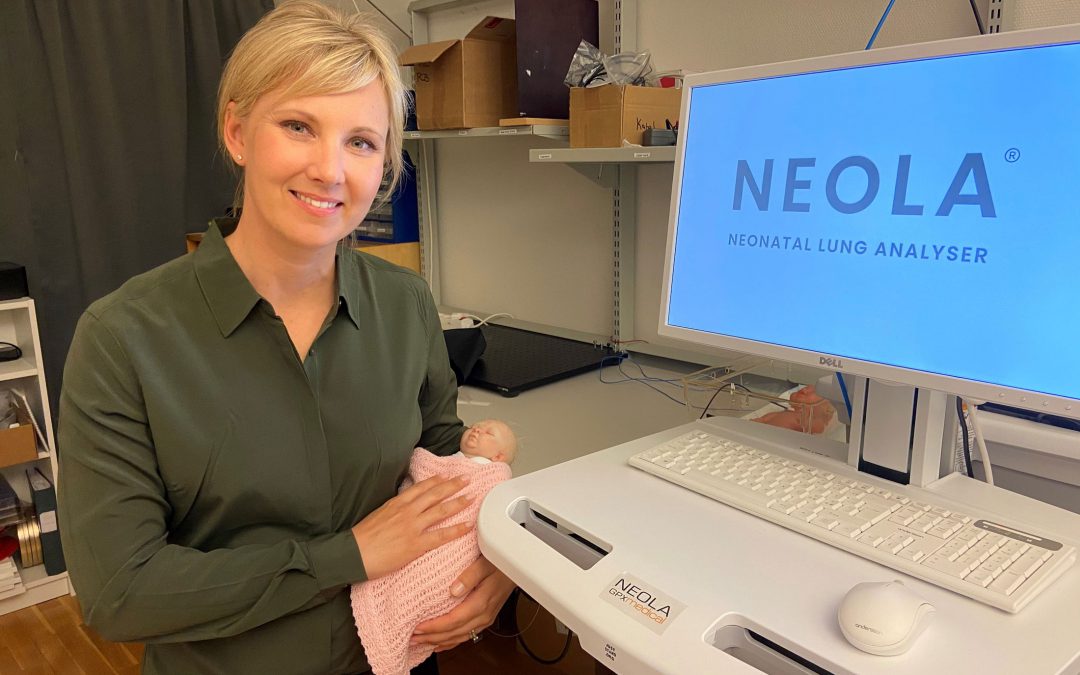Neola Medical is featured in an interview with Business in Lund:
Neola Medical in Lund is working to develop medical technology to monitor lung function in premature babies around the clock. Their innovation is based on unique research from Lund University’s Division of Atomic Physics and it means giving a better start in life for the smallest of children.
“This is a whole new way of seeing the body, just like ultrasound was in its time,” declares Neola Medical’s CEO Hanna Sjöström.
One in ten children worldwide are born preterm, before 37 weeks of pregnancy are complete, which means around 15 million children are born too early every year. And the number of children born preterm is increasing due, among other things, to older mothers, to increased rates of high blood pressure and diabetes, and to fertility treatments increasing the the proportion of twin and triplet births. Many of these premature newborns require neonatal care in order to survive. As the lungs are one of the last organs to develop during a pregnancy, many premature babies have breathing problems.
“Our technology can save the lives of many children and help them to a better life,” states Sjöström. “We know that 50 percent of very preterm birth children at eleven years old show signs of severe disability and that breathing problems are a major cause of this. If you can detect lung collapse or blockages early, then you can give children a better life without disabilities.”
Premature babies in care today are examined through x-ray and invasive blood sampling; methods that can be harmful to the child. Neola Medical is developing a technology that can monitor premature babies for 24 hours straight.
“We can immediately see changes in lung volume without harming the baby. This is a whole new way of seeing the body, just like ultrasound was in its time. Never before have you been able to measure gases inside the body in the way you can with this technology,” says Sjöström.
In practice, Neola Medical’s Neola (neonatal lung analyzer) is placed next to the child’s incubator or ventilator. Light and detection probes are placed on the outside of the child’s body and infrared light is shone through the lungs. By measuring the absorption of light, Neola is able to give a picture of the volume and oxygen content of the lungs.
The lung analyzer is based on research from Lund University’s Division of Atomic Physics under the leadership of Sune and Katarika Svanberg. In 2004, Märta Lewander Xu wrote a dissertation on making harmless gas measurements in the sinuses and lungs using laser technology. This research led to the founding of the company Gasporox, which makes products ensuring food packaging quality. Neola Medical was founded as a subsidiary in 2016 with CEO Hanna Sjöström and Chairman of the Board Märta Lewander Xu.
“I am building the company around the product and making sure to bring it to the international market. Our company’s strength is that we have researchers but also that I as the CEO have a business background. It’s fun to commercialize this innovation from Lund University.”
Neola Medical will sell to neonatal departments and is targeting 4,600 chosen clinics in Europe and the United States. Their lung analysis systems are intended to be sold to hospitals as well as to companies for integration within ventilators through a licensing model. The company is preparing for both CE marking in the EU and approval by the Food and Drug Administration in the United States enabling them to sell in international markets from 2024.
Preclinical studies with good results on healthy newborn babies have been conducted by researchers and published in several eminent publications. In the near future, there are plans to further test monitoring on children. Though recently, a project at Lund University, which Neola Medical is closely involved in, began applying this technology to adults as well.
In 2019, Neola Medical became a member of the SmiLe incubator.
“SmiLe Incubator is an invaluable support for us as a young life science company. They have a pool of highly competent coaches in both financing and development of medical technology products,” says Sjöström.
In 2020, the world has been forced to face something completely new: COVID-19. For Neola Medical it has meant having to postpone raising capital, but it has also built an awareness of ventilators within society.
“It is, of course, surprising to everyone how quickly the corona pandemic has had an effect on healthcare globally. Even the general public has gained insight into the importance of intensive care and lung monitoring. Those of us working with medical technology have long understood the importance of innovations and now we hope that this terrible pandemic would have the good consequence of investment in intensive care for the future. My impression is that medical technology products will see an upswing – but I wish that not so many people had to experience what intensive care is.”
More about Neola Medical
Goal 3 of the UN’s 17 Global Goals for sustainable development focuses on good health and well-being. One of its targets for achieving this is to end preventable deaths of newborns and children under 5 years of age. This is the goal that Neola Medical seeks to address.
Neola Medical’s Neola technology can also be used to diagnose sinusitis, which is a common and painful illness. Many sinusitis patients are given penicillin, but few are actually helped by it. Neola Medical is now evaluating whether their product could support physicians in prescribing less penicillin.
The Neola Medical team consists of five people and in June 2020 will be moving to new premises on Tellusgatan in eastern Lund. Once the market has stabilized, they will expand.
